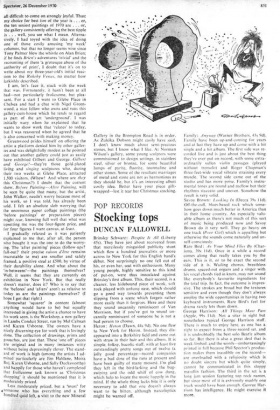POP RECORDS
Stocking tops
DUNCAN FALLOWELL
Brinsley Schwarz: Despite It All (Liberty 45s). They have just about recovered from that mercilessly misguided publicity stunt which flew a hundred journalists or more across to New York for this English band's debut. Not surprisingly no one fell out of his, or even her, seat with enthusiasm. Many young people, highly sensitive to this kind of put-on, were thus inoculated against Brinsley's first album. This, their second, is a cleaner, less hidebound piece of work, soft rock played with unfussy ease, which should go a good way towards preventing them slipping from a scene which forgets rather more easily than it forgives. Here and there they sound uncannily reminiscent of Van Morrison, but if you've got to sound un- cannily reminiscent of someone he is not a bad person to choose.
Heron: Heron (Dawn, 44s 9d). No one flew to New York for Heron. Instead, they dis- appeared into a Berkshire field and came out with straw in their hair and this album. It is simple, folksy, bucolic stuff, with at least five outstandingly pretty songs out of twelve (a jolly good percentage—record companies have a bad dose of the runs at present and have been guilty of many messes). I'm glad they left in the bird-larking and the bug- swiping and the odd whiff of cow dung, which help to locate the music happily in the mind. If the whole thing lacks bite it is only necessary to add that one doesn't always want to be bitten, although narcoleptics might be warned off.
Family: Anyway (Warner Brothers, 43s 9d). Family have been up-and-coming for years and at last they have up and come with a hit single and a hit album. The first side was re- corded live and is just about the best thing they've ever put on record, with some extra- ordinarily sullen violin passages (played without tremolo) and Roger Chapman's three-feet-wide vocal vibrato straining every muscle. The second side came out of the studio and has more poise. Family's instru- mental tones are round and mellow but their rhythms staccato and uneven. Somehow the result is very solid.
Savoy Brown: Looking in (Decca 39s I Id). Off-the-cuff, blues-based rock which some- how goes down much better in America than in their home country. An especially valu- able album as there's not much of this sort of music being produced now and Savoy Brown do it very well. They go heavy on one track (Poor Girl) which is appalling but otherwise the sounds come naturally and un- self-consciously.
Rare Bird: As Your Mind Flies By (Char- isma, 39s 11d). Once in a while a record comes along that really takes you by the ears. This is it. or to be exact the second side of it is. Wailing chorus, breathless drums, spaced-out organs and a singer with his vocal chords tied in knots, may not sound like everybody's favourite ingredients for the total trip. In fact, the outcome is impres- sive. The strokes are broad but the textures sensitive and even though they don't always employ the wide opportunities in having two keyboard instruments, Rare Bird's feel for drama rarely lets them down.
George Harrison: All Things Must Pass (Apple, 99s 1 I d). Not a sitar in sight but nonetheless typical George Harrison stuff. There is much to enjoy here, as one has a right to expect from a three-record set, and it is undoubtedly the best solo Beatle album so far. But there is also a great deal that is weak-limbed. and the words—embarrassingly printed in full because Phil Spector's produc- tion makes them inaudible on the record— are overloaded with a religiosity which is no doubt sincere but which quite simply, cannot be communicated in this sloppy maudlin fashion. The third in the set is a long jam session featuring top rock names, but since most of it is extremely muddy one track would have been enough. George Har- rison has intelligence. He might exercise it MOM.


















































 Previous page
Previous page